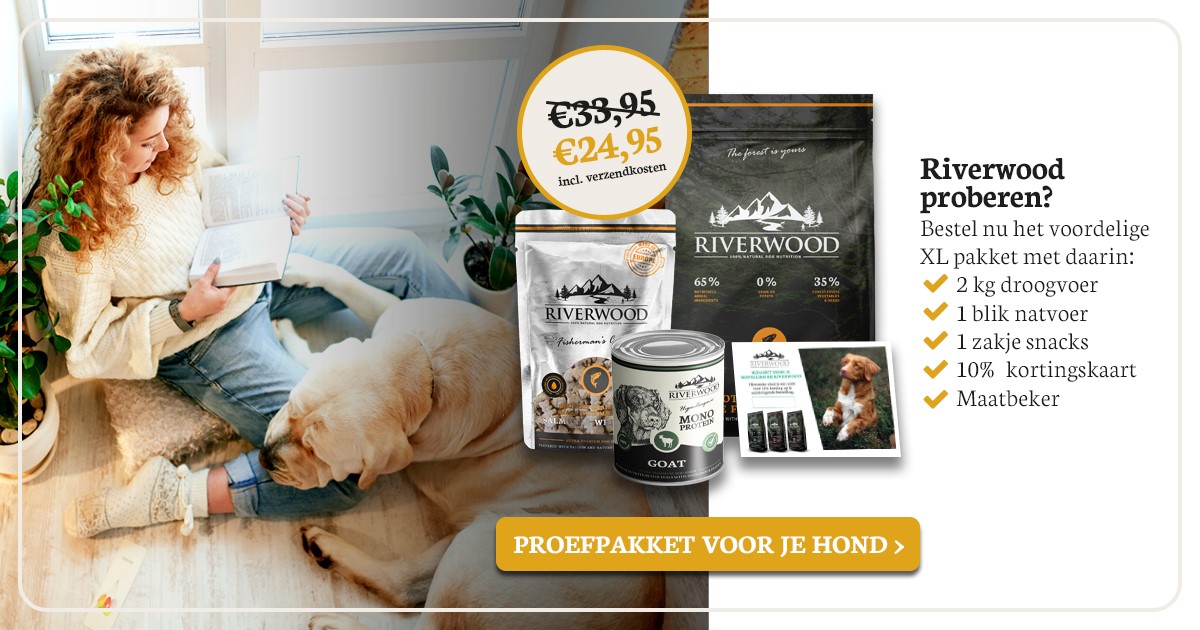Why does my dog scratch? The most common causes of skin and coat problems at a glance
Every dog has an occasional itch that causes him or her to scratch himself or herself. This is normal behavior. But when a dog excessively scratches, bites or licks himself, a bell should ring. Scratching, fortunately, is not a disease per se; it is a symptom. But why is your dog itching? And what should you do to solve it, or even better; how do you prevent itching? Read the most common causes of skin and coat problems in dogs in the blog below.

Symptoms of skin and coat problems
Itching is, among other things, a symptom of an allergic reaction or skin condition. A dog that scratches excessively is obviously noticeable, but there are other symptoms that indicate skin and coat problems. Does your dog have bald patches, scaly, red or irritated skin? Does he/she shed excessively? Does he/she have thick, oily skin? Or does your dog's coat not smell fresh? These are all examples of skin and coat problems that could indicate that your dog is (literally) uncomfortable in his/her skin. It is important to find out exactly what is causing your dog's itchiness to prevent worse.
Most common causes of itching in dogs
Unfortunately, itching is a common symptom found in many conditions. It is incredibly difficult to figure out exactly why your dog is itching. Below we list the most common causes of skin and coat problems in dogs for you:
Moulting
Dogs that are shedding can show many itchy symptoms. Loose hairs stuck in your four-legged friend's coat can become itchy and this causes itching. Make sure that you brush your dog regularly in the shedding period and take him/her to a groomer in a timely manner.
Fleas
When a dog scratches and bites itself excessively, it is often checked to see if the dog has fleas. Just one flea bite can cause an awful lot of itching in your four-legged friend. Places where fleas like to nest in a dog are near the ears, on the back, in the inner thighs and on the belly. Fleas are treatable, but they are persistent. It is important not only to treat the dog itself, but also to thoroughly clean the environment in which it lives. This is because only 5% of fleas are only visible on your pet, the other 95% are in the environment in the form of eggs, for example.
Mites, fungi and other (bacterial) infections
Does your dog have bald spots, dander and/or itching and is this not clearly caused by moulting or pests? Then have your dog checked at the vet for mites, fungi and other (bacterial) infections. By having a skin scraping taken, a veterinarian can see more specifically what type of skin infection your dog has and formulate an appropriate treatment plan accordingly. Not every skin infection is treated the same way, but often an infection can be resolved with a specially prescribed shampoo or ointment that is supplemented with a course of antibiotics in a worse stage.
Food allergy or intolerance
Another common problem is that dogs can become itchy from food. This is because dogs can develop an intolerance to, for example, certain sources of protein (in most cases these are chicken and beef), dairy products, soy, grains and/or gluten and egg. In addition to itching, gastrointestinal problems are also symptoms of a food allergy or intolerance. Good nutrition is essential for your dog's healthy skin and coat, and is at least free of preservatives and fragrances, colors and flavors. You can read about what else good food should be bought in this blog.
Even with a food allergy or intolerance, it is difficult to find out exactly what your dog is reacting to. If you have an idea yourself what your dog is reacting to (for example, because he gets a certain food that he scratches or obviously scratches more after getting a snack with a certain protein source), you can follow an elimination diet. This involves avoiding certain protein sources and/or other food allergens in your four-legged friend's daily menu for a period of time. In doing so, also make sure that you do not give your dog any snacks that contain these food allergens. When switching to a different food, it is important to be patient. It takes about six to eight weeks for a dog's gastrointestinal system to get used to the new food and you will see results.
In an elimination diet, it is important to feed hypoallergenic foods. Fish-based hypoallergenic foods are often chosen in cases of skin and coat problems. Fish-based foods contain high levels of Omega-3 fatty acids, which are important for the overall health of your four-legged friend but also contribute to a healthy skin and coat. The Riverwood Adult Salmon & Whitefish with Herring variety consists of three unique, hypoallergenic sources of protein that are rich in Omega-3 fatty acids, making it an excellent food for dogs with skin and coat problems. Want to spoil your dog responsibly? Then check out Riverwood's range of hypoallergenic chew snacks here.
Do you have no idea what your dog reacts to? Then it is advisable to visit a veterinarian. A veterinarian can take blood from your dog and use it to perform an allergy screening. Based on the results of the allergy screening, you can choose a food that is free of the allergens your dog reacts to.
Omgevingsallergie/atopie
Naast de bovengenoemde oorzaken is het ook mogelijk dat een hond een overgevoeligheid heeft voor stoffen in de lucht. Dit noem je ook wel een omgevingsallergie of atopie. Vaak uit dit zich bij honden in de vorm van jeuk onder de poten of op zijn kop. Deze overgevoeligheid is in veel gevallen seizoensgebonden en kun je vergelijken met hooikoorts, zoals wij mensen dit kennen. Zo kunnen honden bijvoorbeeld reageren op bepaalde bomen, planten, distels of grassoorten. Het is zelfs mogelijk dat een hond overgevoelig is voor huisstofmijt. Klachten die horen bij een omgevingsallergie/atopie ontstaan bij honden meestal al op jonge leeftijd.
Ook in het geval van een omgevingsallergie/atopie kan een dierenarts bloed van jouw hond afnemen en een allergiescreening doen. Een hond kan helaas niet genezen van een omgevingsallergie/atopie. Wel is behandeling mogelijk, maar deze behandeling heeft als doel de klachten onder controle te krijgen zodat de hond een zo goed als mogelijk jeukvrij en prettig leven kan hebben. Een voorbeeld van een behandeling is immunotherapie, dat ook wel desensibilisatie genoemd wordt. Dit houdt in dat er gedurende een langere tijd allergenen in gecontroleerde hoeveelheid bij de hond toegediend worden, om zo het immuunsysteem van de hond langzaam te laten wennen aan de stoffen. Op deze manier wordt de hond uiteindelijk minder gevoelig.
Is jeuk altijd op te lossen?
Er zijn ontzettend veel redenen te bedenken waarom een hond zich krabt of huid- en vachtproblemen heeft. Het kan dan ook een enorme puzzel zijn om de echte oorzaak van jeuk te achterhalen. Gelukkig is er eigenlijk altijd wel een oplossing om jeuk in ieder geval onder controle te krijgen of zelfs helemaal op te lossen. Houd er echter wel rekening mee dat het achterhalen van de oorzaak van jeuk een lang traject kan zijn dat veel tijd, moeite en geld kan kosten. Kom je er zelf niet uit of heb je twijfels? Ga dan altijd naar een dierenarts. Zij zijn tenslotte de enige die een medische diagnose mogen vaststellen én kunnen behandelen.
Heel veel honden genieten al elke dag van Riverwood. Wil jij jouw hond ook laten smullen van onze heerlijke voedingen en ben je benieuwd welke variant het beste bij jouw hond zou passen? Beantwoord hier dan enkele vragen en bestel direct een voordelig proefpakket.




